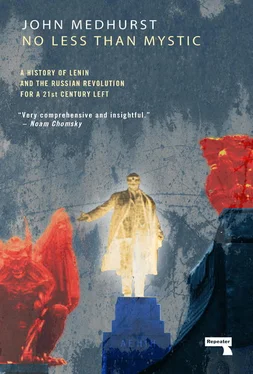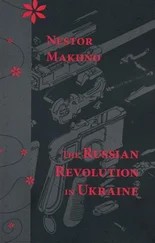The Mensheviks seemed to me admirably intelligent, honest, and devoted to socialism, but completely overtaken by events. They stood for a sound principle, that of working class democracy, but a situation such as the state of siege, fraught with such mortal danger, did not permit any functioning of democratic institutions. 29
This was honestly meant, but naïve. The democratic institutions, and the Menshevik party itself, had been suppressed in early 1918, before the Civil War and the state of siege in Petrograd. When the siege and war were over, democratic institutions and working-class democracy did not return.
If it had ever been the intention to restore them, the first beneficiaries would surely have been the Mensheviks. With a few exceptions they had been the Bolsheviks’ “loyal opposition”, socialists and trade unionists who had never campaigned for the forcible removal of Sovnarcom and had tried, through reasoned criticism and what little input they had to Soviet and other congresses, to expand the sphere of democratic freedom in the new system. None of this mattered. On the contrary, most of the Menshevik Party was now in jail. After the arrest of thousands of Menshevik activists in early 1921, Zinoviev had petitioned Lenin for permission to execute them for complicity in the Kronstadt uprising. But mass executions at that time would have damaged Sovnarcom’s attempts to re-establish diplomatic relations with Britain and France. Therefore, in January 1922 many of the imprisoned Mensheviks were deported to Germany.
By 1923 the battle began at the RSDLP Congress of 1903 was finally over. In June 1923 the Bolshevik cc issued a circular, “On Measures of Struggle with Mensheviks”, which accused them of consciously supporting counter-revolution. The GPU rounded up many of their remaining activists, more than 1,000 in Moscow alone. Most would die in the Gulag. After Martov’s death the Mensheviks faded into a dusty corner of Russian history.
The SRs and the Bund went the same way. The physical resistance of many SRs to the Bolshevik regime–in the south under Komuch, in the Left SR rising of July 1918 and at the time of Kronstadt–sealed their fate. With leading Mensheviks deported, and in any case too well known on the international left to publicly arraign and execute, the SRs became the focus of the first “show trial” of the Soviet Union, a precursor of the Moscow Trials of 1936-38. In June 1922 twelve SR leaders were put on trial for counterrevolutionary activity. All were found guilty and sentenced to death, but following protests from the emigrant Russian community in America, the regime commuted the sentences to imprisonment. The trial, allied to the final suppression of the Green rebellions, destroyed the SRs as a political force inside the Soviet Union, although exiled leaders established a vibrant SR presence in Prague and kept alive the tradition of a populist, democratic socialist alternative to Marxism and Bolshevism.
At the same time the Bund also ceased to function as a mass-based political party. Since 1917 it had lost members to both the Zionist Poalei Zion and to the Communist Bund (Kombund), a breakaway group of Left Bundists that supported the Bolsheviks in the Civil War. In 1920 the Bund officially split into the Communist Bund and the Social–Democratic Bund. In 1921 the Kombund dissolved itself and its members sought admission to the RCP. The mainstream Bund, led by Abramovich, staged a demonstration against the trial of the SRs in 1922, but under pressure of state persecution it gradually disappeared. The Polish Bund, more numerous and better organised, survived intact in Pilsudki’s Poland and continued to organise on behalf of Jewish workers. Bundists helped organise and lead the 1943 Warsaw Ghetto uprising against the Nazis, and fought to the last as it was crushed.
The last independent Russian trade union expired in October 1921. Somehow, until then, the Chemical Workers Union had preserved its independence. Its “Presidium” included two Mensheviks, one Right SR, one Left SR, one anarchist and other non-party activists. At a regional conference in March 1921, Bolshevik delegates proposed that Lenin be elected “Honorary Chair” of the union, but when put to a vote the majority of delegates voted for Martov instead. The contested position then went to a national conference in October, at which twice the number of delegates than usual turned up, the extras being Bolshevik “members” not elected or mandated. A resolution put by the Bolsheviks on the tasks of the trade unions was rejected by 123 votes to 113. At this the Bolsheviks walked out and formed a new union, the “Congress of Red Chemical Workers”, which promptly announced its submission to the state. The old union closed its conference knowing it would be its last. Shortly after, its leaders were all arrested. 30
As early as 1919, in response to the increase in the Menshevik vote in the Soviets and the strikes at former Bolshevik industrial strongholds, Lenin had written, “The industrial proletariat […] has become declassed, dislodged from its class groove, and has ceased to exist as a proletariat”. In early 1921 he wrote, “Since the war the industrial workers of Russia have become much less proletarian than they were before, because during the war all those who desired to avoid military service went into the factories. This is common knowledge”. 31He cited, without evidence, an influx of peasants, ex-students and ex-shopkeepers into the remaining factories. Yet before 1914, when the main base of Bolshevik support had been workers fresh from the village and new to the factories, and it was the Mensheviks who attracted the organised proletariat of the trade unions, this distinction had been unimportant. Possibly Lenin was displaying, once again, his dialectical genius.
By 1922 his political mystique was beginning to wear thin. At the Eleventh Party Congress in March 1922 the party–or, at least, those few delegates who still had independent views and the courage to express them–debated if the Russian working class could be said to anymore exist, and if not what that meant for a “dictatorship” based upon it. Lenin made very clear what input and influence the organised workers, such as they were, could have over their working lives. He told the congress:
It is absolutely essential that all authority in the factories should be concentrated in the hands of management. Under these circumstances any direct intervention by the trade unions in the management of enterprises must be regarded as positively harmful. 32
In a remarkable speech Lenin dismissed the working class of 1922 as people who had migrated to the factories to avoid the Civil War, although it was unclear why a peasant would migrate from the country where there was, supposedly, a grain and food surplus, to starving Petrograd under siege by the Whites. He also, by implication, dismissed the entire Russian working class in whose name his party retained power. Asking if “real proletarians” came to Russia’s factories and plants, he answered,
It is true in Marx’s terms, but Marx was not writing about Russia. He was writing about all capitalism as whole, starting from the 15th century. Over the course of six hundred years it is true, but for present day Russia it is not true. 33
Alexander Shliapnikov, shortly after to be sent on diplomatic missions where he could cause no more difficulties, responded with the bitter sarcasm of a veteran working-class Bolshevik who had seen all the party’s promises of 1917 betrayed and reversed. “Vladimir Ilyich said yesterday that the proletariat as a class, in the sense that Marx meant, does not exist”, he told the Congress. With restrained but obvious contempt he addressed Lenin directly. “Permit me to congratulate you”, he said, “on being the vanguard of a nonexistent class”. 34
Читать дальше












